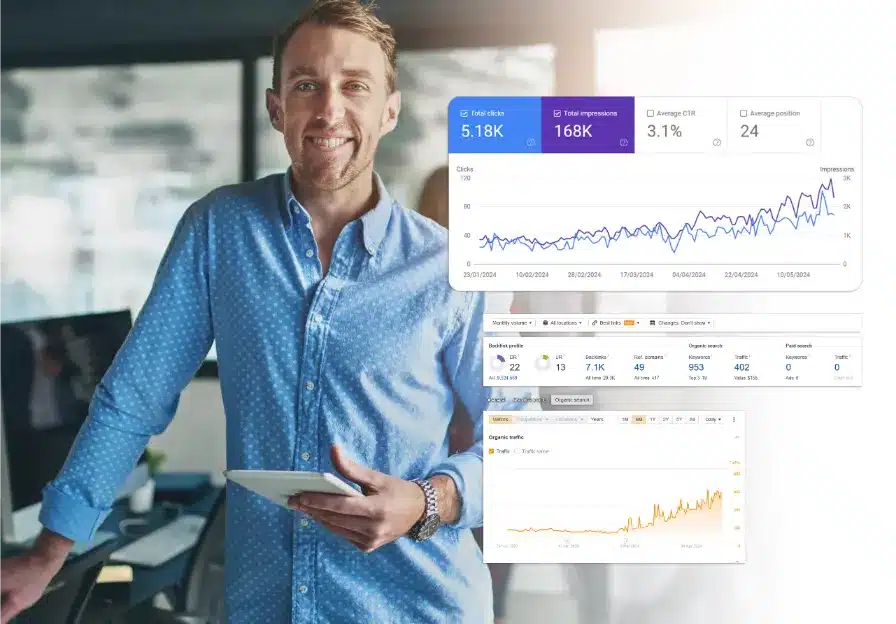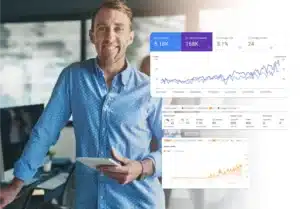Master SEO for Pages: Complete Optimization Guide

When businesses want to improve their online visibility, mastering SEO for pages becomes a fundamental requirement for success. Every webpage represents an opportunity to attract targeted visitors from search engines, but only when properly optimized can these pages achieve their full potential. Whether you’re managing a single landing page or an entire website, understanding how to implement effective page-level optimization strategies can transform your digital presence. At Superlewis Solutions, we help businesses across North America develop comprehensive page optimization strategies that drive meaningful results. Contact us at +1 (800) 343-1604 or through our contact form to discuss how our expertise can enhance your page optimization efforts.
This comprehensive guide will walk you through the essential elements of page-level search engine optimization, from technical foundations to content strategies that convert visitors into customers. You’ll learn about keyword research and implementation, on-page optimization techniques, content structure best practices, and advanced strategies that help pages rank higher in search results.
Understanding the Foundation of Page Optimization
Page optimization has evolved significantly since the early days of search engines. What began as simple keyword stuffing has transformed into a sophisticated discipline that balances user experience with search engine requirements. Modern search algorithms prioritize pages that provide genuine value to users while maintaining technical excellence.
The current landscape demands a holistic approach to page optimization that considers multiple factors simultaneously. Search engines now evaluate page loading speed, mobile responsiveness, content quality, user engagement metrics, and technical implementation. This shift reflects search engines’ commitment to delivering the most relevant and useful results to users.
Recent developments in artificial intelligence and machine learning have further refined how search engines interpret and rank pages. These technologies enable search algorithms to better understand context, user intent, and content quality, making it more important than ever to create pages that genuinely serve user needs while following optimization best practices.
Essential Elements of Effective SEO for Pages
Successful page optimization requires attention to several critical components that work together to improve search visibility. The foundation starts with comprehensive keyword research that identifies the terms and phrases your target audience uses when searching for products, services, or information related to your business.
Title tags represent one of the most important on-page elements for search optimization. These HTML elements tell search engines and users what your page is about, and they appear as clickable headlines in search results. Effective title tags incorporate target keywords naturally while remaining compelling enough to encourage clicks from potential visitors.
Meta descriptions provide additional context about your page content and appear beneath title tags in search results. While these descriptions don’t directly influence rankings, they significantly impact click-through rates by giving users a preview of what they’ll find on your page. Well-crafted meta descriptions include relevant keywords and compelling calls-to-action that encourage users to visit your site.
Header tags create a logical content hierarchy that helps both users and search engines understand your page structure. Proper use of H1, H2, and H3 tags organizes information effectively while providing opportunities to include relevant keywords in prominent positions throughout your content.
Content Structure and Keyword Implementation
Creating content that satisfies both search engines and users requires careful attention to structure and keyword placement. The most effective pages feature content organized in a logical flow that guides readers through information systematically while maintaining engagement throughout their visit.
Keyword density and placement play crucial roles in page optimization, but modern approaches emphasize natural integration rather than forced repetition. Search engines can detect when keywords appear artificially or excessively, potentially penalizing pages that employ these outdated tactics. Instead, focus on incorporating keywords naturally within high-quality, informative content that addresses user needs.
Internal linking connects your pages to other relevant content on your website, creating pathways that help users discover additional valuable information while signaling to search engines the relationships between different pages. Strategic internal linking can improve page authority and help distribute ranking power throughout your site.
Content length and depth significantly impact how search engines evaluate page quality. While there’s no universal ideal length, pages that thoroughly cover their topics tend to perform better than those with superficial treatment. Comprehensive content demonstrates expertise and provides more opportunities to include relevant keywords and related topics naturally.
Technical Optimization Considerations
Technical aspects of page optimization often determine whether your content can achieve its full ranking potential. Page loading speed has become increasingly important as search engines prioritize user experience, with slow-loading pages potentially losing rankings regardless of content quality.
Mobile optimization ensures your pages display properly across all devices, particularly smartphones and tablets. With mobile searches now representing a significant portion of total search volume, pages that don’t function well on mobile devices face substantial ranking disadvantages.
URL structure contributes to both user experience and search engine understanding of your page content. Clean, descriptive URLs that include relevant keywords help users understand what they’ll find on your page while providing search engines with additional context about your content.
Image optimization involves more than just file size reduction. Proper alt text, descriptive file names, and appropriate image formats all contribute to page optimization while improving accessibility for users with visual impairments.
| Optimization Element | Impact Level | Implementation Difficulty | User Experience Effect |
|---|---|---|---|
| Title Tags | High | Low | Moderate |
| Page Speed | High | Moderate | High |
| Mobile Responsiveness | High | Moderate | High |
| Content Quality | Very High | High | Very High |
| Internal Linking | Moderate | Low | Moderate |
| Image Optimization | Moderate | Low | Moderate |
How Superlewis Solutions Transforms Page Performance
At Superlewis Solutions, we understand that effective SEO for pages requires a comprehensive approach that balances technical excellence with compelling content creation. Our team brings over two decades of experience in online marketing to help businesses across various industries optimize their pages for maximum search visibility and conversion potential.
Our SEO marketing services focus on creating pages that not only rank well but also convert visitors into customers. We begin with thorough keyword research to identify the terms your target audience uses when searching for your products or services. This research informs our content strategy and helps ensure your pages attract qualified traffic with genuine purchase intent.
We provide comprehensive page optimization that includes technical audits, content creation, and ongoing monitoring to ensure sustained performance. Our approach incorporates advanced tools like ahrefs.com/” target=”_blank” rel=”noopener”>Ahrefs and semrush.com/” target=”_blank” rel=”noopener”>SEMrush for detailed analysis and tracking, combined with AI-powered optimization techniques that give our clients competitive advantages.
Our content creation services complement our SEO efforts by producing high-quality, conversion-focused content that addresses user needs while incorporating optimization best practices. We create everything from detailed service pages to informative blog posts that establish your expertise and encourage visitor engagement. Contact us at sales@superlewis.com or schedule a video meeting to discuss how we can optimize your pages for better performance.
Proven Results Through Strategic Implementation
Our clients consistently experience significant improvements in search visibility and conversion rates through our strategic page optimization approach. We focus on creating sustainable results that continue delivering value over time, rather than quick fixes that may compromise long-term performance.
The integration of cutting-edge AI technology with proven optimization principles allows us to identify opportunities and implement improvements that many businesses miss. Our systematic approach ensures every element of your pages works together to achieve your business objectives while maintaining search engine compliance.
Advanced Strategies for Page Optimization Success
Beyond fundamental optimization techniques, advanced strategies can provide competitive advantages that help your pages outperform others in your industry. Schema markup implementation helps search engines better understand your content, potentially earning rich snippets that make your pages stand out in search results.
User experience signals increasingly influence search rankings, making it essential to create pages that engage visitors and encourage extended browsing sessions. Factors like bounce rate, time on page, and pages per session all contribute to how search engines evaluate page quality and relevance.
Content freshness and regular updates signal to search engines that your pages remain current and relevant. Establishing a system for reviewing and updating page content ensures your optimization efforts continue producing results over time while maintaining accuracy and relevance.
Local optimization considerations become particularly important for businesses serving specific geographic areas. Location-specific keywords, local business schema, and geographic content elements can help pages rank better for location-based searches.
Measuring and Monitoring Page Performance
Effective page optimization requires ongoing measurement and adjustment based on performance data. Key metrics include organic traffic growth, keyword ranking improvements, conversion rates, and user engagement indicators that reveal how well your pages serve both search engines and users.
Regular analysis of page performance helps identify opportunities for improvement and ensures optimization efforts align with business objectives. This data-driven approach enables continuous refinement that maximizes the return on your optimization investment.
Future-Proofing Your Page Optimization Strategy
The landscape of search engine optimization continues evolving as technology advances and user behaviors change. Voice search optimization, artificial intelligence integration, and enhanced mobile experiences represent emerging trends that forward-thinking businesses should consider when optimizing their pages.
Preparing for these changes involves creating flexible optimization strategies that can adapt to new requirements while maintaining current performance levels. This includes focusing on user intent rather than just keywords, creating comprehensive content that answers related questions, and ensuring technical infrastructure can support emerging technologies.
Staying informed about search engine algorithm updates and industry best practices helps ensure your page optimization efforts remain effective over time. The most successful businesses treat optimization as an ongoing process rather than a one-time project, continuously refining their approach based on results and changing requirements.
Conclusion
Mastering SEO for pages requires a comprehensive understanding of both technical requirements and user needs. Success comes from balancing search engine optimization with genuine value creation, ensuring your pages attract qualified visitors while encouraging meaningful engagement and conversions.
The most effective page optimization strategies combine thorough keyword research, technical excellence, compelling content creation, and ongoing performance monitoring. By focusing on these fundamental elements while staying current with industry developments, businesses can create pages that consistently perform well in search results while serving their target audience effectively.
As search engines continue evolving and user expectations increase, how will you ensure your pages remain competitive in an increasingly complex digital landscape? What opportunities might you be missing by not fully optimizing every page on your website? How could improved page optimization transform your business’s online presence and customer acquisition efforts?
Ready to transform your page optimization strategy and achieve better search engine results? Contact Superlewis Solutions today at +1 (800) 343-1604 or visit our SEO marketing services page to learn how our proven optimization techniques can help your pages rank higher and convert better. Our experienced team is ready to help you create pages that not only attract more visitors but also turn them into loyal customers.
Transform Your Business
Enter your details (right), along with a brief message and we will reply quickly within 2 business days.
We can also meet in person or by Teams video meeting to discuss SEO marketing and content creation services.
Phone (Toll Free)
+1 (800) 343-1604
Postal Address
Superlewis Solutions Ltd
PO Box 33531, RPO Cottonwood,
Maple Ridge, BC, Canada V4R 0H2







